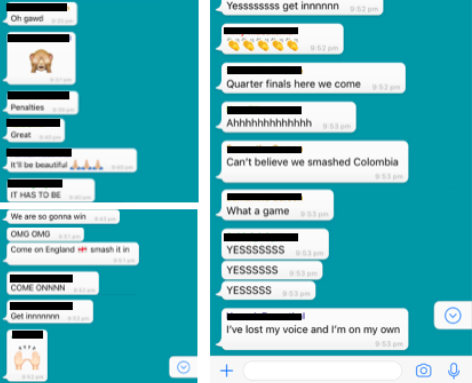Football fever well and truly swept the nation on Tuesday night; with an absolutely incredible result for England, in what’s been a pretty thrilling World Cup so far.
I watched the match at home, whilst trying to keep up with the running commentary from my friends, on our WhatsApp group chat.
Although not physically watching in the same place, we experienced the rollercoaster together; from the first 90, through to extra time and the tense penalty shoot out, before the magical moment that saw us through to the the Quarter Finals – exhausting!

So here’s the interesting thing.
A WhatsApp group of 14 thirty-something year old women, (spanning a broad range of careers and life stages), were all completely and utterly engaged, passionate, and glued to their screens for 120+ minutes watching… football.
So why is there a distinct lack of advertising aimed at a female audience during the world cup?
It would surely deliver brands massive cut through, great stand out and if executed well, some serious kudos, fame and positive brand sentiment.
Frustratingly, all I see during the ad breaks are razors, beers, gambling and cars – all stereotypically aimed at men.
According to ITV, the match peaked with an audience of 24.4 million, the highest for any World Cup match so far this year.
When Dier’s winning goal hit the back of the net, and England were through, roughly four in five people watching TV in the UK were tuned in.
Stats suggest that when England play, female viewership equates to over 40% of the audience, so on Tuesday night we can assume that around 10 million of us were pretty much being ignored by brands.
Combine this with the fact that women make 70-80% of purchasing decisions and have a combined global purchasing power of 18 trillion dollars, it might be time for brands to have a serious think about this missed opportunity on a global scale.
Sadly, reports from Russia have charted 35 incidents of sexual harassment or assault, with a rep saying, “This is the worst sexism we have ever seen at a world cup.”
Brands have a platform and a place in society to step up and condemn these deeper issues with sexism in sport, by spreading a more inclusive message through their campaigns.
So don’t ignore us, because right now that very same WhatsApp group are excitedly arranging where we will all be watching the most anticipated game of the World Cup tomorrow – COME ON ENGLAND!
Written by Carly Lucas, Partnerships Director at Latimer.

